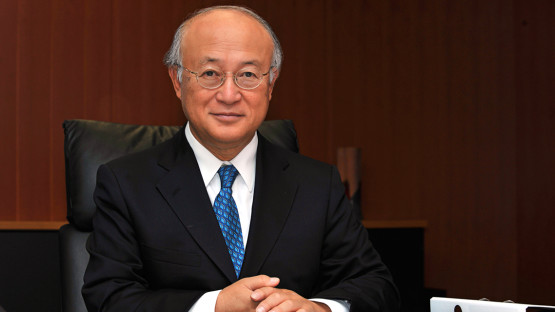(As prepared for delivery)
Good morning, Ladies and Gentlemen.
I would like to address two issues: one is the challenges to nuclear proliferation and the other is issues related to the use of nuclear technology by developing countries.
Ladies and Gentlemen,
Two years ago, the IAEA played an important part in bringing about a landmark international agreement concerning Iran’s nuclear programme, known as the Joint Comprehensive Plan of Action.
The Agency is now verifying and monitoring Iran’s implementation of its nuclear-related commitments under that agreement, acting as the eyes and ears of the international community.
The JCPOA represents a clear gain for nuclear verification. Iran is subject to the world’s most robust nuclear verification regime. Our inspectors are on the ground 24/7. We monitor nuclear facilities, using permanently installed cameras and other equipment.
Iran accepted many restrictions on its nuclear programme, which is now smaller than it used to be. The IAEA has expanded access to sites and information.
The Iran case demonstrates that even complex and challenging issues can be tackled effectively if all parties are committed to dialogue – not dialogue for its own sake, but dialogue aimed at achieving results.
The IAEA was able to make a vital contribution, and maintain the confidence of all sides, by sticking to its technical mandate and not straying into politics.
As far as North Korea is concerned, our inspectors had to leave the country in 2009. Since then, North Korea has continued to develop nuclear weapons. It launches missiles and threatens other countries. What used to be a regional threat has become a threat to global peace and security.
The IAEA works hard to collect and evaluate information regarding North Korea’s nuclear programme, using satellite imagery and open-source information. Our inspectors are ready to return to North Korea at short notice if political developments make this possible.
Ladies and Gentlemen,
As for the use of nuclear material by developing countries, I do not think that increased use of nuclear technology necessarily poses a risk. It rather means an opportunity for everyone.
The right approach is engagement. Use of nuclear technology requires a lot of obligations. Countries must join major international treaties, establish nuclear laws and regulatory bodies ensure safety and security and implement safeguards – among other things. The IAEA can provide assistance to strengthen countries’ nuclear infrastructure, which helps to reduce the risks.
The wrong approach is to try to prevent countries from having access to nuclear technology. Such an approach is not do-able. It is against the international legal framework and has no legitimacy. In fact, it can be harmful to nuclear safety, security and nonproliferation, because in such a case countries may acquire nuclear technology without having proper nuclear infrastructure.
That concludes my introductory remarks.
Thank you.


